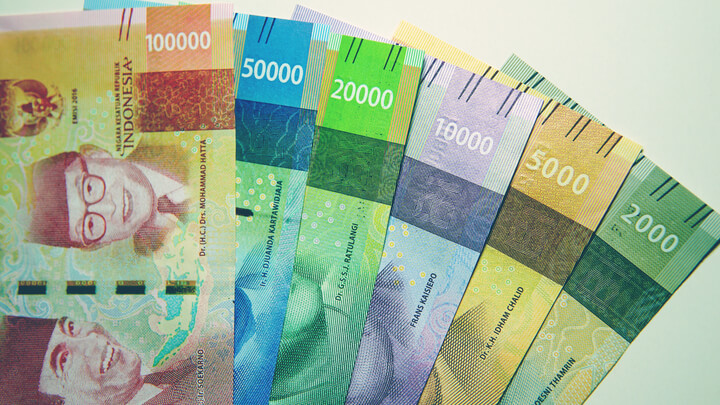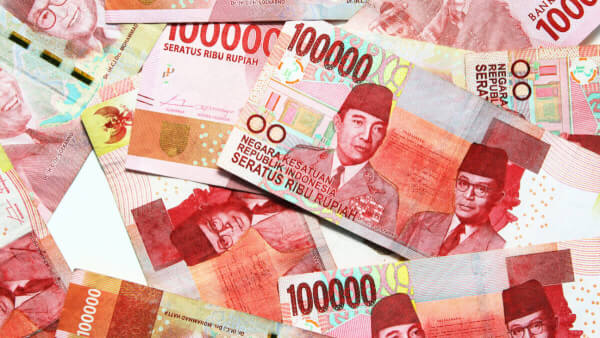ATMs in Indonesia: credit cards and fees
Everything you need to know about using ATMs in Indonesia

The climate, the chance to snorkel and dive in pristine waters, the hustle and bustle of Jakarta and the opportunity to delve into an exotic and unique cultural heritage - there are so many reasons to visit Indonesia.
With everything Indonesia offers, it’s little wonder that its tourism sector is booming. Indonesia welcomes nearly a million visitors a month in its peak season.
If you’re off to visit or to stay a little longer, then you need to understand (and get your hands on) Indonesian money. This guide gives you an overview of how to do just that.
The official currency of Indonesia is the Rupiah, also known in currency offices as IDR.
Whether or not other currencies can be used varies from business to business. Large hotels and tourist stores may accept other currencies such as U.S. dollars. However, expect to generally end up paying more to use your foreign currency. Additionally, in some of the more unscrupulous places, prices will be advertised in U.S. dollars and the merchant may try to charge you more if you specifically ask to pay in IDR. If this is the case, then your best bet is to go elsewhere for the goods or services you're after.
| --- | --- |
| Rupiah Symbols | IDR, Rp |
| 1 IDR | Although the rupiah used to be divided into 100 sen, these are no longer used outside of accounting and financial reports. |
| IDR coins | The coins in circulation are in denominations of 100, 200, 500 and 1000 rupiah. |
| IDR banknotes | Banknotes come in 1000, 2000, 5000, 10000, 20000, 50000 and 100000 denominations. |
You’ll find prices are rounded to the nearest rupiah if they're not in neat whole numbers already. In some stores, you may be given a handful of candies to make up for the rounding.
Although the government announced plans to replace the banknotes with a more secure issue of notes, this will likely take time. The notes in circulation presently are brightly coloured with images of traditional buildings and activities on the back.
It’s always worth shopping around, but it’s likely that you’ll get a better exchange rate if you exchange your cash once you arrive in Indonesia. Depending on where you are in the world, rupiah might not be carried by your local exchange bureau, anyway. Save the hassle by buying your currency upon arrival.
If you need some cash immediately, then only exchange a little at the airport. Better yet, consider using an ATM to get what you need when you land. The exchange rates offered at airports (and, for that matter, hotels), are often poor. Head into town to exchange your money where competition drives a better deal for the customer.
Wherever you choose to exchange your cash, you do need to scrutinise the small print. The exchange desk might claim that they offer ‘zero commission’ exchanges, for example, but that doesn’t mean that they don’t make a profit. Instead, they simply sneak in their gain through offering you a poorer exchange rate.
In Indonesia - as elsewhere in the world - there are some fairly common scams when exchanging cash. One is to simply not mention a commission charge, or to advertise an exchange rate which is only available on larger transactions. Make sure you know what you’re getting before you commit.
You can spot a poor deal if you understand the mid-market rate. This is the only real exchange rate and can be used to compare the rates offered to tourists. The mid-market rate fluctuates frequently, but you can always check the live one by using a currency converter online.
The difference between the mid-market rate and the rate you’re offered for your exchange (plus any declared fees) is the actual profit that the money changer is making.
If you’re carrying cash to Indonesia to exchange, then make sure that you bring clean and crisp banknotes. Generally, exchange desks prefer larger bills (with some even offering better rates for higher denominations). Any marked or ripped banknotes are likely to be refused. When they are counting out your money, ask for larger bills as these are easier to count in the course of the transaction and don’t get distracted when your money is being counted out. Make sure you don’t fall prey as a tourist.
Traveller’s Checks aren’t readily accepted in Indonesia. You may be able to cash and exchange them at some banks, but the rates are seldom as good as when you exchange cash. To make the exchange, you’ll also have to carry your passport which many travellers prefer to avoid.
Overall, many travellers are moving away from using Traveller’s Checks entirely in favour of a mix of cash, credit/debit card and ATM withdraws.
Credit and debit cards can be used in larger stores, restaurants and hotels in Indonesia. Though it’s still worth carrying cash for smaller transactions at cafes and markets or if you travel to some of the more out of the way or rural areas
Inform your bank, with reasonable notice, that you’ll be travelling to Indonesia. If you don’t, then it’s possible that you might find your card blocked because of ‘suspicious activity’.
When you use a foreign credit or debit card, you might be asked if you want to be charged in your home currency. This is an example of what is called Dynamic Currency Conversion (DCC).
When you pay, DCC allows you to see the cost of the transaction shown in your home currency. It’s billed as a ‘service’, making it easier to manage your cash in a familiar currency. However, it’s actually a win for the foreign banks - and not a good deal for you.
Using DCC means that the exchange rate used will be chosen by the local bank, and will not be as good as the one your home bank will give you. Do not agree to pay in your home currency - always opt to pay in the local currency instead.
ATMs are common in the larger cities and tourist spots. Use the ATM locators below to find a convenient ATM in your card provider’s network.
Visa ATM locator
MasterCard ATM locator
Amex ATM locator
Check with your bank to see what their foreign fees are, and find out if they have any partnerships with banks in Indonesia
You’ll probably be charged a fee for foreign withdrawal by your bank or card provider. Check this before you travel as some banks offer fee-free withdrawals, especially on premium accounts.
Even if your home bank doesn’t operate in Indonesia, it’s worth asking if they have a branch there, or if they work in partnership with a local bank. If they do, you might be able to get free or reduced fee ATM withdrawals while you are there.
You may also be charged additional fees by the ATM provider. You’ll usually be asked if you want to complete the transaction in English, though, which should make it easier to understand what fees are being added.
Because the ATM will recognise your card as foreign, you’ll probably also be offered DCC (described in the previous section). This means that you’ll be asked if you want to be charged for the withdrawal in your home currency. Always select to be charged in local currency, to avoid excessive charges and poor exchange rates.
Despite the charges, ATM usage is still preferred by many travellers because- assuming you avoid DCC - you should get a fair exchange rate from your home bank, making it economical overall.
Indonesia has a complex banking system with national and regional banks serving different populations and needs. Some banks, for example, are set up to offer Sharia-compliant banking. There are also branches and services of many foreign banks available in Indonesia due to the large expat population. See if your bank is represented in the short list below.
Another option, for simple access to your money abroad - and an even better deal - it to use Wise.
If you have a bank account in Indonesia, or know someone who does, you can transfer money between accounts using the real mid market exchange rate. It's a convenient way to get your cash, with no hidden fees.
*Please see terms of use and product availability for your region or visit Wise fees and pricing for the most up to date pricing and fee information.
This publication is provided for general information purposes and does not constitute legal, tax or other professional advice from Wise Payments Limited or its subsidiaries and its affiliates, and it is not intended as a substitute for obtaining advice from a financial advisor or any other professional.
We make no representations, warranties or guarantees, whether expressed or implied, that the content in the publication is accurate, complete or up to date.

Everything you need to know about using ATMs in Indonesia